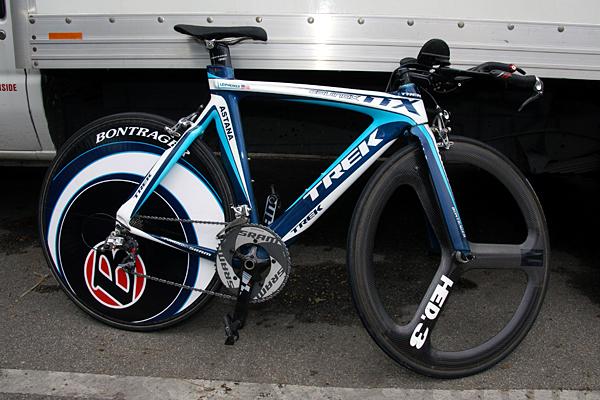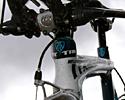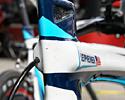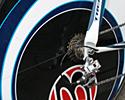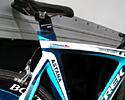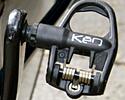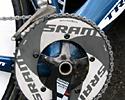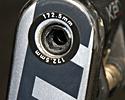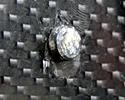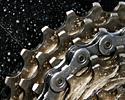
Recently on Cyclingnews.com |
Pro bikes, February 24, 2008
Levi Leipheimer's Astana Trek Equinox TTX 9.9 SSL
Going even more aeroBy James Huang, Technical Editor Astana captain Levi Leipheimer may very well have secured the overall lead at this year's Tour of California after posting the fastest time in the Stage 5 time trial around Solvang. Team sponsor Trek has equipped the California resident with its latest Madone 6.9 frame for the road but Leipheimer is also using a newly upgraded time trial machine now as well.
Slippery shapeTrek says Leipheimer's new Equinox TTX 9.9 SSL is not only the most aerodynamic frame it has ever crafted but also one that is measurably faster than those of some of his key competitors. The usual features are certainly on hand, such as the deep section down tube, seat tube, seat stays and fork, but other smaller details supposedly set Astana's machines apart from the field. Nearly every aspect of the Equinox shape has been designed to ease the transition of passing air from frame section to frame section. According to Trek, the widely-set fork blades allow air to pass through more easily than the more typical narrowly-spaced prongs, saving 0.1lb of drag in the process. From there, the elongated fork crown offers a nearly seamless jump to the dropped down tube, which is set closely enough to the front wheel to supposedly form a fairly continuous surface between the two. Naturally, the seat tube is fitted with a deep cutout to shield the rear wheel. Most importantly, though, all of Trek's aero talk isn't just for semantics. Trek claims that Leipheimer posted the lowest drag numbers ever recorded by a male athlete on his new machine during a pre-season wind tunnel session in San Diego and that efficient position certainly aided him on the Solvang time trial course.
Light and stiff, tooIn addition to being aero, though, Leipheimer's Equinox TTX 9.9 SSL is supposedly also stiff and light, too. The markedly wide top tube bears an unusual I-beamlike profile from the very front of the head tube nearly all the way to the seat tube. This not only maintains better airflow along its length but Trek also says the shape is 50% stiffer than the previous TTX. Leipheimer's SSL version also benefits from Trek's Red Series carbon fiber content and lay-up schedule, which knocks 300g off of last year's frame. Some weight savings also come courtesy of a new build kit for 2008. Leipheimer's rear wheel isn't actually a Bontrager product in spite of the decal camouflaging; rather, it's a Lightweight model from German outfit CarbonSports. According to Trek team liaison Ben Coates, the Wisconsin-based company gave Team Director Johan Bruyneel the freedom to choose which disc wheels Astana used in competition as Bontrager wasn't able to produce enough of its own Aeolus TT discs for all of the riders. As it is, the Lightweight's sub-900g weight offers a 200g advantage over the Aeolus anyway and its stiff feel made for a worthy substitute (albeit an expensive one as the team has to pay for them). However, Coates says that the giant Bontrager decals aren't just for sponsorship purposes. Team testing apparently has shown that the Lightweight's somewhat porous surface isn't quite as fast as a non-porous one, so the decals (made by Victory Circle Graphix in Colorado) made the wheels faster, too. Bontrager does supply Leipheimer's Race X Lite Carbon base bar, though, which is fitted with a pair of Race XXX Lite Carbon Aero brake levers and a set of exceptionally narrowly-spaced HED clip-on aero bars. Out back, Leipheimer perches himself atop a custom-covered Selle Italia SLR T1 saddle.
Going RedAstana has also swapped from Shimano Dura-Ace to SRAM Red this year which drops another 150g or so from 2007… at least on paper. Leipheimer's bike at Tour of California was fitted with a prototype SRAM TT big ring that is still in development but reportedly substantially heavier than target figures, so it's hard to say how much of an advantage it really offered that day. Either way, the new carbon fiber TT shifters are a definite improvement from Dura-Ace weight-wise and the uniquely adjustable positioning capabilities also make for better rider customization. The PowerDome cassette only drops about 15g relative to Dura-Ace, but its novel construction should make it quite a bit more rigid and the all-steel cogs should wear better, too. Even with his performance in Solvang, it's impossible to say for certain whether or not Leipheimer will be able to repeat his performance from last year. Stage 6 throws four categorized climbs at the peloton before it finishes with a long uphill grind to Santa Clarita and the race's final stage heads upwards 1100m (3600ft) immediately from the start before the riders get to make the downhill run into the finishing circuits in Pasadena. Leipheimer might wish that race could end right now, but we'll all have to wait until Sunday to see if he can hold on until the end.
PhotographyFor a thumbnail gallery of these images, click here Images by James Huang/Cyclingnews.com
| |||||
Full specificationFrame: Trek Equinox TTX 9.9 SSL, size small |
Critical measurements | ||||

